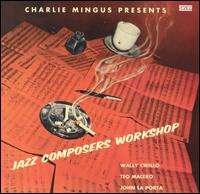Jazz Composers Workshop
Jazz Composers Workshop is an album featuring jazz bassist Charles Mingus. It combines the earlier album Moods of Mingus with a Wally Cirillo session released earlier on the album Wally Cirillo & Bobby Scott. It was released on the Savoy label.[2]
| Jazz Composers Workshop | ||||
|---|---|---|---|---|
 | ||||
| Studio album by | ||||
| Released | April 1956[1] | |||
| Recorded | October 31, 1954 (#1-4, 9-10) January 30, 1955 (#5-8) Van Gelder Studio, Hackensack | |||
| Genre | Jazz | |||
| Length | 41:25 | |||
| Label | Savoy MG 12059 | |||
| Producer | Ozzie Cadena | |||
| Charles Mingus chronology | ||||
| ||||
Reception
The Allmusic review by Scott Yanow awarded the album 2½ stars stating "The complex music on this LP finds bassist Charles Mingus looking toward contemporary classical music in some of the rather cool-toned arrangements. It was not until later in 1955 that he found the right combination of influences in which to express himself best but these slightly earlier performances have their moments".[3]
| Review scores | |
|---|---|
| Source | Rating |
| Allmusic | |
| The Rolling Stone Jazz Record Guide | |
Track listing
- All compositions by Charles Mingus except as indicated
- "Purple Heart" - 5:36
- "Gregarian Chant" - 2:51
- "Eulogy for Rudy Williams" - 6:22
- "Tea for Two" - 6:19 (Irving Caesar, Vincent Youmans)
- "Smog L.A." - 3:14 (Wally Cirillo)
- "Level Seven" - 4:17 (Cirillo)
- "Transeason" - 4:23 (Cirillo)
- "Rose Geranium" - 4:13 (Cirillo)
- "Getting Together" - 4:41
- "Body and Soul (Alternate Take 1)" - 3:07 On CD reissue
Personnel
- Charles Mingus - bass
- John LaPorta - clarinet (tracks 1, 2, 4, 9 and 10), alto saxophone (track 3)
- Teo Macero - tenor saxophone (tracks 2-10), baritone saxophone (track 1)
- George Barrow - tenor saxophone (track 1), baritone saxophone (tracks 2-4, 9 & 10)
- Wally Cirillo (tracks 5-8), Mal Waldron (tracks 2-4, 9 & 10) - piano
- Kenny Clarke (tracks 5-8), Rudy Nichols (tracks 1-4, 9 & 10) - drums
gollark: It's not like you need specialized equipment nowadays, just £30 for a RTL-SDR and antennas.
gollark: How are they meant to *know* if you receive a radio signal?
gollark: There's no real point in making myriad subchannels for a channel which isn't very busy in the first place.
gollark: Also, splitting up <#426054105577029654> seems silly as it is not very high-traffic anyway.
gollark: If you have an SDR, you can just scan through a lot of them and look.
References
- Billboard Apr 28, 1956
- Charles Mingus discography accessed June 8, 2011
- Yanow, S. Allmusic Review accessed June 8, 2011
- Swenson, J., ed. (1985). The Rolling Stone Jazz Record Guide. USA: Random House/Rolling Stone. p. 141. ISBN 0-394-72643-X.
This article is issued from Wikipedia. The text is licensed under Creative Commons - Attribution - Sharealike. Additional terms may apply for the media files.